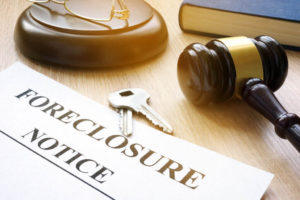Foreclosure After COVID-19 – Can Bankruptcy Help?

The COVID-19 pandemic has left many people asking how to stop foreclosure proceedings and if filing for bankruptcy can help. In many cases, bankruptcy can help you avoid foreclosure, but it’s important to be aware of the issues involved. Keep reading to learn more from our experienced bankruptcy attorneys.
How Bankruptcy Chapter 7 Can Help Avoid Foreclosure
There are two main types of bankruptcy proceedings under the US Bankruptcy Code. The first is Chapter 7 bankruptcy, also known as liquidation bankruptcy.
Chapter 7 bankruptcy is what most people may think of as the “typical” bankruptcy filing. When you file for Chapter 7 bankruptcy, non-exempt assets may be liquidated to pay back your creditors. In many chapter 7 cases, all the assets are exempt or the non-exempt assets are too nominal to justify being liquidated. However, your house may be liquidated by a trustee in chapter 7. If the house is liquidated, the debtor receives the exemption amount upon sale. In North Carolina, the homestead exemption is $35,000.00. In chapter 7, many debts are discharged.
As an added benefit, once you file for bankruptcy, you get what’s known as an automatic stay from the bankruptcy court. An automatic stay is a court order that prevents your creditors from taking any further legal action against you and your property, including continuing with foreclosure proceedings. This automatic stay can give you time to try to work out an arrangement with your mortgage holder so you can keep your home. However, a workout will be voluntary with the mortgage holder and chapter 7 only provides temporary (3-12 weeks) protection. Even after an automatic stay expires, you may be able to keep your home while proceeding with Chapter 7 bankruptcy.
Bankruptcy Chapter 13 and Foreclosure
The other main type of bankruptcy proceeding available to individuals is a Chapter 13 bankruptcy. A Chapter 13 bankruptcy filing is also sometimes known as a reorganization bankruptcy.
When you file for bankruptcy under Chapter 13, you put together a payment plan to pay back your creditors over three to five years. You’re allowed to keep all of your assets regardless of whether or not those assets are exempt or not exempt. This includes your home. In a typical chapter 13 case, the pre-bankruptcy arrears are paid off over the duration of the plan term. However, a chapter 13 debtor can still pursue a loan modification with a mortgage servicer. In the Eastern District of North Carolina, a modification can be done directly between the homeowner and mortgage servicer or a modification can be pursued through a court recognized mediation program.
If the court approves your payment plan and you make all your payments on time, your eligible debts will be discharged and you’ll be able to keep your home. However, it is essential that the chapter 13 plan payments be made.
A bankruptcy attorney can outline the key differences between a Chapter 7 and Chapter 13 bankruptcy case, as well as help you find the right option for you.
Contact a Cary Bankruptcy Attorney at Sasser Law Firm
Still have questions about foreclosure and bankruptcy? Contact the North Carolina bankruptcy attorneys at the Sasser Law Firm today by calling our office or visiting our contact page. We take on emergency cases, including to stop a foreclosure. We have filed more than 9,000 cases. We may be able to help you pursue the financial relief you need during this challenging time.
- About the Author
- Latest Posts
For more than 20 years, the Sasser Law Firm has been helping individuals and business owners sort through financial hardships to see the light at the end of the tunnel. Our North Carolina bankruptcy attorneys are all board-certified specialists, which means we have passed a complex exam, undergone a thorough peer review, and continue to earn legal education credits in this ever-evolving area of law.














